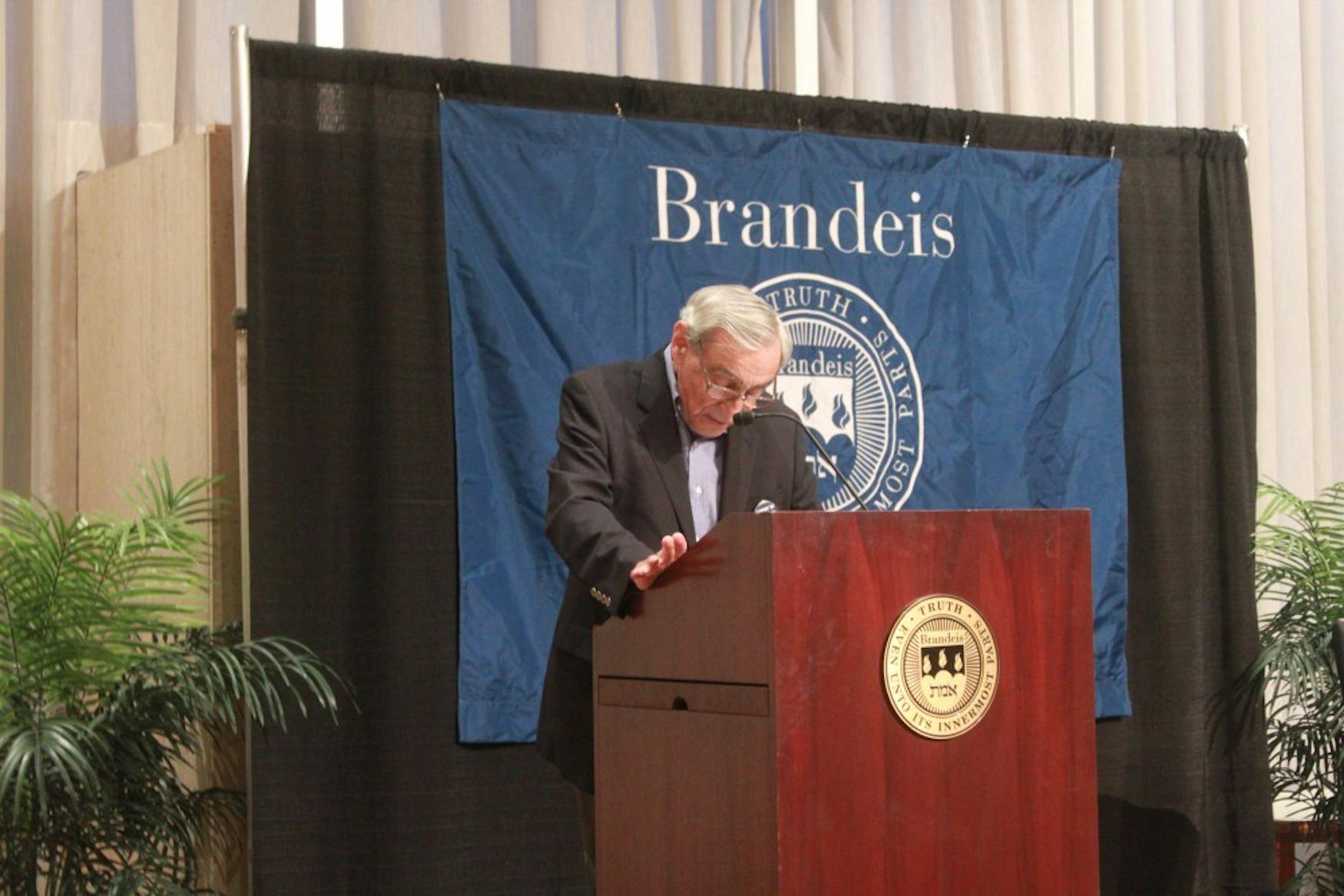Walzer explores Buber’s ‘‘Paths in Utopia’’ in talk
Michael Walzer ’56 discussed the nature of community and provided a criticism of Martin Buber’s book “Paths in Utopia” in a lecture delivered on Monday afternoon in the Rapaporte Treasure Hall. Buber’s “Paths in Utopia” examines the Kibbutz movement and analyzes authoritarian socialism.
Interim President Lisa Lynch began the event, which was titled “States and Communities: Martin Buber’s Paths in Utopia Revisited,” by introducing Walzer, recounting how she read his 1977 book “Just and Unjust Wars” as a student while she studied both economics and politics. “His works have influenced generations of students and faculty and policymakers alike,” Lynch said. She also highlighted the Michael Walzer ’56 Award for Teaching, an award given to a tenure-track faculty who combine “superlative scholarship with inspired teaching” and is “one of the highlights of the faculty meeting at the end of the year,” according to Lynch.
Following introductions from Jules Bernstein ’57, Walzer’s long-time friend and founder of the Louis D. Brandeis Legacy Fund for Social Justice, and Prof. Bernard Yack (POL), Walzer began his critique of Paths in Utopia.
In his critique, Walzer explained that Buber’s 1947 book is “a sharp attack on state socialism presented by Marx and Lenin and a strong defense of communitarian socialism. More simply, … it is an attack on the state and a defense of the community.” He pointed out that the book ends with the famous line, “the choice for humanity lies between the two poles of socialism, one of which is represented by Moscow and the other, Jerusalem.” Walzer also posited that the two options proposed by Buber are no longer embodied by Moscow and Jerusalem and have now grown into more complex ideas that “are not particularly embodied by particular geographic locations.”
The majority of Walzer’s lecture contrasted Buber with Leon Bloom, three-time Prime Minister of France, and David Ben Gurion, the first Prime Minister of Israel.
Under Bloom, the French Republic proved to be a strong state that existed “for much too short a time in the 1930s,” Walzer said. Walzer remarked that Bloom’s state was under pressure from socialism at the time, a different type of pressure than was outlined in Buber’s “Paths in Utopia,” since the general population wanted the power of the state to be used for specific reasons, not generally limited. “At the same time, vigorous political action by citizens creates a kind of community, not perhaps Buberian in character, but close enough,” Walzer said.
Walzer explained that Buber’s doctrine of community was not utopian and called for a minimalist state since the state had “surplus power” for legitimate tasks, including lawmaking and defense. Instead, Walzer explained, Buber made the Kibbutz, a collective living arrangement during British Mandatory Palestine, his primary example of communities within communities. Walzer argued that states could not be considered communities, since they extend beyond the borders of communities, and citizenship extends across communal boundaries.
Walzer recounted a story from his hometown in Johnstown, Penn., where the Bethlehem Steel Company had refused to hire Black and Jewish workers in the 1930s and a strike by steel workers took place. Walzer noted that the story forced a government intervention that ended with worker unionization, though he noted that the ordeal has little relevance today, since the steel mill has since closed.
“That moment of political creation, … those years where men and women came alive as articulate agents of their own destiny, … that is, it seems to me, the kind of supreme human value. And it doesn’t matter that it is momentary as long as we realize that it can be recurring,” Walzer noted. He said the key to success in Johnstown came from the fact that the people had a state, and noted, “Everybody needs a state. A state that can protect them and the others with them.”
“I’d like to think right now, in the world that we live in, [Buber] would agree before anything else everyone needs … a state of their own; Tibetans, and Kurds, and Palestians, and yes, the Jews too,” Walzer said.
Walzer concluded the talk with a question-and-answer session with audience members. The talk was hosted by the Mandel Center for the Humanities and presented by the Louis D. Brandeis Legacy Fund for Social Justice.
—Morgan Brill contributed reporting.



Please note All comments are eligible for publication in The Justice.